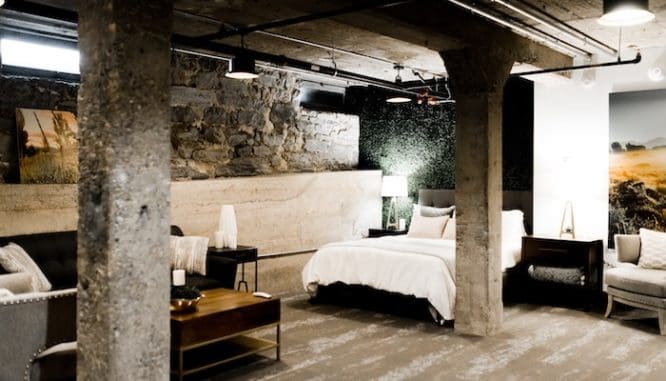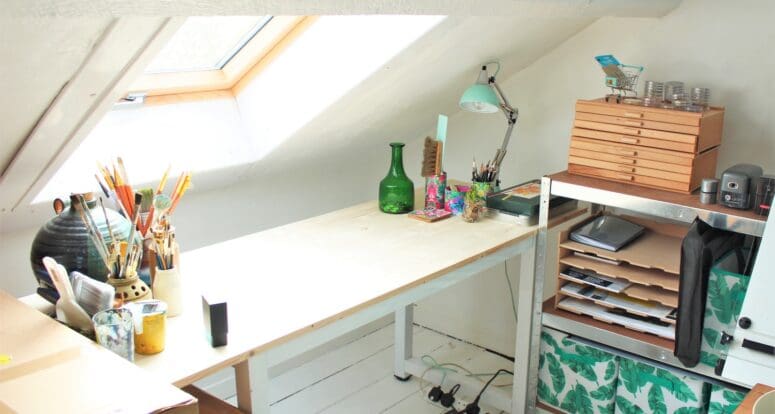What Exactly Is a Bonus Room — And What Can You Do With It?
- Published on
-
 Alesandra Dubin Contributing AuthorClose
Alesandra Dubin Contributing AuthorClose Alesandra Dubin Contributing Author
Alesandra Dubin Contributing AuthorAlesandra Dubin is a lifestyle journalist and content marketing writer based in Los Angeles. Her vertical specialties include real estate; travel; health and wellness; meetings and events; and parenting. Her work has appeared in Business Insider, Good Housekeeping, TODAY, E!, Parents, and countless other outlets. She holds a master's degree in journalism from NYU.
You’re looking at a listing you love and notice a “bonus room” described among its features. But what does that really mean? In short, it means an extra room that isn’t technically a bedroom — and can be whatever you want it to be.
For a homeowner, the function of a bonus room “changes depending upon what stage of life you’re in,” explains Amber Harvalias, a top-selling agent based in Burlington, North Carolina, who works with 70% more single-family homes than the average agent in her area. For instance, in 2020, Harvalias noted, “We are now in a pandemic, and a bonus room has definitely increased in value and taken on a whole new meaning.”
That is to say, people need more from their home environment these days than they ever did before, and bonus rooms are poised to provide it.
“People need a place to work from home, they need a place to do homeschooling, they need a place to work out at home,” she says. “And they just need flex space to get away from one another. Sometimes that bonus room is a second TV or a playroom for the children — it just depends on what you need.”
The technical definition of a bonus room actually varies from area to area, so it helps to know what to look for and what vocabulary is used regionally to describe it. If you do close on a home with a bonus room, here are some ideas for how to make the best use of your space given its missing features and unique characteristics.

What is a bonus room?
A bonus room is a room in a house that is not a kitchen, bathroom, family room, hallway, or closet — but for one or more particular reasons, it doesn’t qualify as a bedroom, either. This room might show up over a garage, for example, or represent attic or basement space in some states.
The types of bonus rooms you might find, and the terms used to describe them, vary across the country.
For instance, in some states, bonus rooms are also known as FROGs when they are located directly above the home’s garage — hence the acronym, which stands (aptly) for “finished room over garage.” These rooms might be longer and narrower than a typical bedroom due to the shape of the garage below.
What makes a bedroom… a bedroom?
You might be wondering: Why wouldn’t a seller just call it a “bedroom” instead of a bonus room and potentially drum up more interest in the listing? There’s a reason why sellers don’t: A bedroom must have specific minimum qualities in order to be legally described as such.
Definitions of a bedroom can actually vary depending on the state. In most states, a room must have minimum square footage — usually 70 to 80 square feet — to count as a bedroom. It must also be of a minimum width, typically seven feet.
A bedroom must have a certain ceiling height, usually of seven feet, according to the International Residential Code; half of the ceiling in the space must meet that mark in most states. It must also have a closet; a door (not just an entryway); and a window (and that window must be big enough to meet the state’s standards, usually 5.7 square feet). The home’s HVAC systems must also extend into the room for it to qualify as a bedroom.
Some states also mandate how many outlets should be in a room in order to call it a bedroom. Requirements might mandate one outlet per wall, or one outlet per a certain length of wall, for example.
Note that a room without these characteristics can’t technically be called a bedroom… but it’s certainly up to you whether you choose to use the space as one, anyway!

What can you do with a bonus room?
Now that we’ve established why that room isn’t technically a bedroom but is in fact a bonus room, the next thing to decide as a potential buyer is how to use that special additional space.
One approach is to designate it as a multipurpose room — with a setup that can accommodate a home office, guest room, and exercise equipment all at once, for instance.
“When there’s not a pandemic, most people are using a bonus room space for an extra TV, a gaming area, a movie theater,” Harvalias says. “Often bonus rooms don’t have one specific purpose. Often, they’re large enough to be a movie theater or game room but still have your treadmill or your elliptical in there.”
If you’re interested in a more focused purpose for your bonus room, here are some ideas for what to make of a space with unique features.
If it’s missing a closet…
If your extra space has no closet, it can work great as a home office setup with a desk and bookcases. Or imagine it as a media room or gaming room.
It might be a kids’ playroom, with bins, baskets, or shelving to organize toys. Add equipment (or even just a mat and a mirror) and it’s a home gym or yoga room. And since the typical short-term visitor doesn’t really need a closet, this space can function well as a guest room.
Modern family living doesn’t always require the trappings of old traditions — especially during times of upheaval, such as in the pandemic — and Harvalias describes how that can look when it comes to inventing a bonus room out of necessity.
“We’ve seen many people even changing their dining room that they never use, selling their formal dining room table, and that becomes their new bonus room space,” she says.
If the ceilings are low or sloped…
Young (and still short!) kids might love to make a bonus room with a sloped or low ceiling into a kid’s bedroom; it makes for a cozy and special environment.
The same idea applies to a kids’ playroom, or a homework room tucked away from distractions. This type of room can also work as a library or gaming room. Add builtins to customize the unusual space and max out its functionality.

If it’s missing a window or a door…
A bonus room without a door could make a nice crafting space (where privacy is not needed). Same goes for a laundry room.
A room without a window is perfect for a music room, where you’d likely want to minimize noise bleed in both directions.
“Sometimes people will go in and finish unfinished attic space, which typically does not have a window in it,” Harvalias says. And sometimes, she says, a bonus room without a window becomes a perfect walk-in closet.
If there’s no HVAC in the room…
Try using a bonus room with no HVAC as a library, or a place for teens to hang out. Of course, if the bonus room has no HVAC but the home is located in a mild climate, you have even more options!
If it’s low on outlets…
A bonus room with limited power outlets is obviously not an ideal pick for a home office, say. But it is ideal for a yoga room or a home gym (with analog equipment).
What are your hobbies, your passions, your family’s needs? Maybe it’s a meditation room, a dance studio, a crafting or sewing room, a gift-wrapping room, or a reading nook.
Overall, a bonus room is perfect when it’s used just the way you want and need.
Header Image Credit: Sema Martin / Unsplash.com
